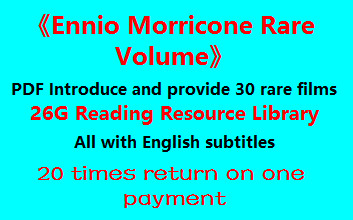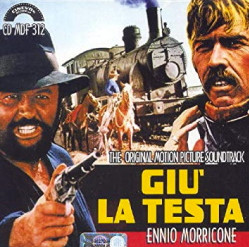GIÙ LA TESTA (1971)
Giù La Testa – known various in English as Duck, You Sucker! or A Fistful of Dynamite – is the last great spaghetti western directed by Sergio Leone. The film stars Rod Steiger as Miranda, an amoral Mexican outlaw who leads a criminal bandit gang made up of members of his family; his life changes when he meets John Mallory (James Coburn), an Irish republican who has fled to Mexico to escape from British forces and is now working as a silver prospector. Eventually the unlikely pair gets caught up in the Mexican revolution when a plot to blow up a bank and steal money from the vault goes wrong, and leads to them being hailed as heroes to the cause.
Morricone’s score for Giù La Testa is probably the least well-known score he wrote for a Leone movie, but is still steeped in the beauty, creativity, and occasional deep weirdness that he always brought to films like this. It’s anchored by a main theme, obviously called “Giù La Testa,” which features earnest strings underneath a playful, almost lounge-like melody, Alessandro Alessandrini whistling, Edda dell’Orso’s haunting wordless soprano, and a peculiar touch wherein a vocalist sings the name ‘Sean’ over and over again – this being an important plot point in the film related to Mallory. “Scherzi a Parte” reprises the main theme for a plethora of different instrumental textures, each more cheerful and carefree than the last, while the 9-minute “Invenzione Per John” offers extended takes on all the core ideas, including more vocal performances of ‘Sean Sean Sean’.
“Marcia degli Accattoni” is a sequence which somehow incorporates the croaking vocals from Quando le Donne Avevano la Coda, a statement of Mozart’s "Eine Kleine Nachtmusik”(Music see here)‘Eine Kleine Nachtmusik,’ and all manner of unusual instrumental touches into a quirky march theme; as odd as it is, it actually becomes quite insistent and serious as it develops, and turns into a terrifically effective piece of action and suspense. Later, the underlying melody of this theme receives an emotional oboe arrangement in the brief “Addio Messico”,
Other cues of note include “Mesa Verde,” a haunting piece for evocative woodwinds and strings; the warmly nostalgic “Messico e Irlanda”, which features some lovely writing for strings and guitar; and the tensely dissonant suspense of “Rivoluzione Contro,” a Morricone hallmark. The final vocal version of the main theme is a perfect coda.
When you compare this with the likes of A Fistful of Dollars or The Good the Bad and the Ugly it pales in comparison – let’s face it, anything would – but there is a great deal to admire about Giù La Testa. The laid-back attitude of the main theme is a little deceptive, because there is actually a lot going on, in the way it captures the devil-may-care attitude of the main character, but also surreptitiously reveals his motivations. The idiosyncratic orchestrations and offbeat rhytms are pure Morricone, and the whole thing will appeal to anyone who is drawn to his spaghetti western style. The score has been released numerous times over the years; this version of the album is the one released by Cinevox in the year 2000 and runs for a touch under an hour, but there are several others which features more score, various bonus tracks, all of which are worthy of exploration.
Track Listing: 1. Giù La Testa (4:16), 2. Amore (1:41), 3. Mesa Verde (1:40), 4. Marcia Degli Accattoni (5:54), 5. I Figli Morti (6:05), 6. Addio Messico (0:53), 7. Scherzi a Parte (2:24), 8. Messico e Irlanda (4:57), 9. Invenzione Per John (9:05), 10. Rivoluzione Contro (6:45), 11. Dopo l’Esplosione (3:22), 12. Giù La Testa (3:00). Cinevox CDMDF-212, 50 minutes 2 seconds.












